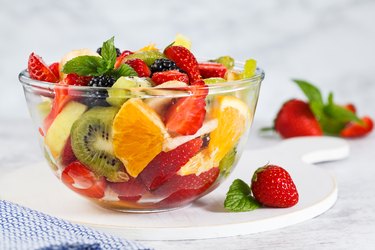
There's no question that fruits and vegetables are packed with vital nutrients crucial for good health. But if you have irritable bowel syndrome (IBS), you want to know which veggies and fruits are safe for IBS, and which ones could lead to a flare because they're harder to digest.
Try Watching Your FODMAPs
Video of the Day
"People with IBS should eat fruits and vegetables that are considered low 'FODMAP,'" says Elena Ivanina, DO, a gastroenterologist at Lenox Hill Hospital in New York City.
Video of the Day
FODMAPs are a very specific group of high-carbohydrate foods, according to Harvard Health Publishing. FODMAP stands for fermentable oligosaccharides, disaccharides, monosaccharides and polyols, which are specific food components that could be irritating when digested. Here are some examples:
- Oligosaccharides are in garlic, onions, wheat and beans.
- Disaccharides are in dairy products, like milk, soft cheeses, yogurt, custard and ice cream.
- Monosaccharides are carbohydrates such as fructose, a naturally occurring sugar found in many foods such as apples, mangos and honey.
- Polyols are naturally in mushrooms, avocados and many foods with artificial sweeteners or sugar alcohols, such as chewing gum.
Dr. Ivanina says any foods with high fructose corn syrup or artificial sweeteners are among the worst foods for IBS.
Other fruits high in FODMAPs that might lead to IBS symptoms, according to the National Institute of Diabetes and Digestive and Kidney Diseases (NIDDK) and the International Foundation for Gastrointestinal Disorders (IFFGD), include:
- Apricots.
- Cherries.
- Nectarines.
- Pears.
- Plums.
- Watermelon.
- Juice containing any of these fruits.
- Dried fruit.
When it comes to veggies, NIDDK suggests steering clear of these additional high FODMAP choices:
- Artichokes.
- Asparagus.
- Cabbage.
- Cauliflower.
- Lentils.
- Sugar snap or snow peas.
Read more: 11 Foods to Avoid When You Have IBS
Foods Getting a Green Light
So, what fruits and vegetables tend to get the all-clear sign? According to Cleveland Clinic, fruits in this group include:
- Berries.
- Bananas.
- Kiwi.
- Citrus (yes, oranges are fine for IBS).
Vegetables in this group, per Cleveland Clinic and Monash University, include:
- Greens like spinach and bok choy.
- Tomatoes.
- Squash.
- Sweet potato.
- Zucchini.
You might also wonder what snacks are good for IBS. Dr. Ivanina suggests treats like:
- Bananas with a little peanut butter.
- Rice crackers.
- A handful of berries or mixed nuts.
- Smoothies made with low FODMAP ingredients.
- Sweet potato or banana chips.
Trying a Low FODMAP Diet
If you suspect that your current diet may be worsening your IBS symptoms, talk with your doctor or dietitian about trying an IBS diet plan that's considered low FODMAP. The initial phase of a low FODMAP diet typically removes all high FODMAP foods. The IFFGD states that this phase of the diet generally lasts around six to eight weeks. That's about how long it will take to tame your symptoms. This restrictive diet is not meant to be a lifetime diet.
Once you've eliminated the high FODMAP foods from your diet, the next phase is to add those foods back in, but only one at a time. By slowly reintroducing foods, you'll be able to see which ones trigger IBS flare-ups. Then you can design a personalized diet for you that doesn't include those specific foods, according to the NIDDK.
If cutting out all high FODMAP foods isn't a good option for you, you might instead first try simply eating less (or none) of the more commonly aggravating foods to see if your symptoms improve. According to Harvard Health, you might start by cutting out these culprits:
- Garlic.
- Onions.
- Beans.
- Apples.
- Milk.
- Mushrooms.
- Wheat.
Ensuring that you get the right amounts of fiber and nutrients while avoiding all high FODMAP foods can be difficult to do without medical help, Harvard Health points out. In fact, cutting out too many foods could lead to nutritional deficiencies, so consult with your doctor or a registered dietitian for the best approach for your overall health.
- Elena A. Ivanina, DO, gastroenterologist, Lenox Hill Hospital, New York City
- Harvard Health Publishing: "The Lowdown on the Low-FODMAP Diet"
- National Institute of Diabetes and Digestive and Kidney Diseases: "Eating, Diet, and Nutrition for Irritable Bowel Syndrome"
- International Foundation for Gastrointestinal Disorders: "The Low FODMAP Diet Approach: Guidelines for a Low-FODMAP Diet”
- Cleveland Clinic: "The Best and Worst Foods for IBS"
- Monash Univeristy: "FODMAPs and Irritable Bowel Syndrome"
Is this an emergency? If you are experiencing serious medical symptoms, please see the National Library of Medicine’s list of signs you need emergency medical attention or call 911.